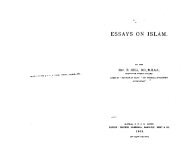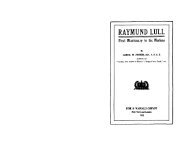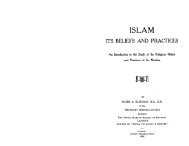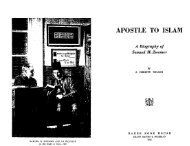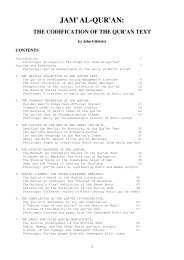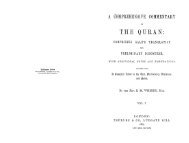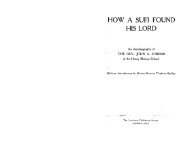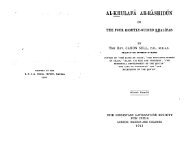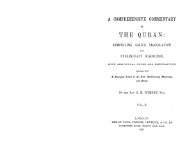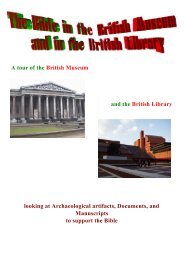Guillaume--Life of Muhammad.pdf - Radical Truth
Guillaume--Life of Muhammad.pdf - Radical Truth
Guillaume--Life of Muhammad.pdf - Radical Truth
Create successful ePaper yourself
Turn your PDF publications into a flip-book with our unique Google optimized e-Paper software.
35°<br />
The <strong>Life</strong> <strong>of</strong> ,Huhaml/lad<br />
l\:ly sons, transgress not the proper lirnits<br />
Transgressing the bounds brings one to a halt.<br />
a my sons, trust not the days.<br />
Envare their treachery and the passage <strong>of</strong> time.<br />
Knmv that it consumes all creation,<br />
Both the new and the old.<br />
Liye your lives in piety and godliness.<br />
Abandon obscenity and hold fast to what is right. I<br />
In the following poem he mentioned how God had honoured them with<br />
Islam and His special favour in sending His apostle to them:<br />
I Ie abode among Quraysh some ten years<br />
Hoping for a friend to help him.<br />
He displayed himself to those who came to the fairs<br />
But found none to <strong>of</strong>fer him hospitality.<br />
But when he came to us God displayed his religion<br />
And he became happy and contented in ::\Iedina. z<br />
He found friends and ceased to long for home<br />
And was plainly helped by God. 3<br />
He told us what Noah said to his people<br />
And what I\Ioses answered when he was called.<br />
None ncar at hand need he fear<br />
And those afar he reeked not <strong>of</strong>. 4<br />
\Ve spent on him the best <strong>of</strong> our possessions,<br />
Sparing not our lives in war at his side.<br />
\Ve knO'v that there is nought beside God<br />
And we knmv that God is the best guide.<br />
We shall fight any man tbat fights Him,<br />
Be he our dearest friend.<br />
In every mosque when I pray to Thee<br />
I say Blessed art Thou (Oft have I mentioned Thy name).<br />
I say when I traverse a land I fear<br />
'I\1ercy! Let not my enemies triumph over me.'<br />
Go where you \vill death comes in many.guises<br />
And you cannot live for ever.<br />
A man does not know how to protect himself<br />
Unless he makes God his protector.<br />
The palm that needs waterS cares naught for its owner<br />
If it has moisture, though he be dead (291).<br />
I The influence <strong>of</strong> Syriac as in the words shammasa and tukhlllrl is clear, and some <strong>of</strong> the<br />
verses are reminiscent <strong>of</strong> the Psalms.<br />
Z Tiba, 'the Fragrant', is the ancient honorific <strong>of</strong> :\1edina. Cf. I;Iassan's opening line on<br />
p. 1022, 'In Tiba arc the monuments <strong>of</strong> his luminous sojourn'.<br />
3 \V.'s text 'III' was a plain help to us from God' seems inferior to the C. text.<br />
4 The verse is just as banal in the original.<br />
S I follow C. in reading mu'ima for \V.'s muqima, and tGwiya for thdwiya 'standing'.<br />
The <strong>Life</strong> <strong>of</strong> iVluhammad 239<br />
(T. 'Ali b. ~vlujahid said on the authority <strong>of</strong> l\:l11hammad b. 1s0aq from T. 12S3.<br />
al-Zuhri and from l\luhammad b. :)alil) from al-Sha'bl that they both said:<br />
The B. Isma'll dated from the fire <strong>of</strong> Abraham to the building <strong>of</strong> the<br />
temple when Abraham and Isma'll built it; then they oated from the<br />
building <strong>of</strong> the temple until they dispersed, and it happened that whenever<br />
people left Tihama they dated from their leaving it, and those who<br />
remained in Tihama <strong>of</strong> B. Isma'il used to date from the going out <strong>of</strong><br />
Sad and C'Jahd and Juhayna <strong>of</strong> B. Zayd from Tihama until Ka'b b. Lu'ayy<br />
died. Then they dated from the death <strong>of</strong> Ka'b to the elephant. The dating<br />
from the time <strong>of</strong> the elephant continued until 'Umar b. al-Khanab dated<br />
from the Hijra which \vas the year 17 or 18. 1<br />
THE NAMES OF THE JEWISH ADVERSARIES<br />
About this time the Jewish rabbis showed hostility to the apostle in envy, 351<br />
hatred, and malice, because God had chosen His apostle from the Arabs.<br />
They were joined by men from al-Aus and al-Khazraj \vho had obstinately<br />
clung to their heathen religion. They were hypocrites, clinging to the<br />
polytheism <strong>of</strong> their fathers denying the resurrection; yet when Islam<br />
appeared and their people flocked to it they \vere compelled to pretend<br />
to accept it to save their lives. But in secret they were hypocrites whose<br />
inclination was towards the Jews because they considered the apostle a liar<br />
and strove against Islam.<br />
It was the Jewish rabbis who used to annoy the apostle with questions<br />
and introduce confusion> so as to confound the truth with falsin'. The<br />
Quran used to come dovl'l1 in reference to these questions <strong>of</strong> theirs,~though<br />
some <strong>of</strong> the questions about \vhat was allowed and forbidden came from<br />
the Muslims themselves. These are the names <strong>of</strong> those Jews;<br />
From B. al-:t\~a~l1r: I:Iuyayy b. Akhtab and his brothers Abll Yasir and<br />
Judayy; Sallam b. Misbkam; Kinana b. al-Rabi' b. Abfl']-lIu'layq;<br />
SalHim b. Abu.'I-I:Iuqayq Abll Rafi' al-.~'war whom the apostle's companions<br />
killed in Khaybar; al-Rabl' b. al-Rabl' h. Abll'I-I.Iuqayq; 'Amr<br />
b. Ja~J:1ash; Ka'b b. al-i\shraf who belonged to Tay', <strong>of</strong> the clan <strong>of</strong> B.<br />
Nabhan, his mother being from B. al-Nac;lir; al-l:Iajjaj b. 'Anu, an ally <strong>of</strong><br />
Kab; and Kardam b. Qays, an ally <strong>of</strong> Ka'b.<br />
From B. Thalaba b. al-Fi\yaun: 'Abdullah b. Sllriya the one-eyed \\ho<br />
w?" the most learned man <strong>of</strong> his time in the Hijaz in Torah studies; Ibn<br />
~alu.ba; and l\;Iukhayriq their rabbi who became a l\iluslim.<br />
From B. Qaynuqa': Zayd b. al-Lasit (29'); Sa'd h. I:Iunayf; Mal.unfld<br />
b. Say!)an; 'Uzayr b. Abu 'Uzayr; and Abdullah b. Sayf (292). Su\\ayd b. 35'<br />
al-l;Iarith; Rifa'a b. Qays; Fin!)a,; Ashya'; Nu'man b. Ada; Ba1}riy b.<br />
I This paragraph is part <strong>of</strong> a long chapter which T. de\"otes to the question <strong>of</strong> chronology<br />
in reference to the principal events in the prophet's life. It is put herc because the last<br />
passage he quates from I.I. is the poem <strong>of</strong> Abu Qays mentioning the length <strong>of</strong> the rrophet's<br />
sojourn in .\1ecca after the beginning <strong>of</strong> his mission; the connexion with chronologv is<br />
obvious. .



